

-
- Departments and Graduate School Programs
- Centers and Institutions

The only research institute studying various aspects of wine and grapes
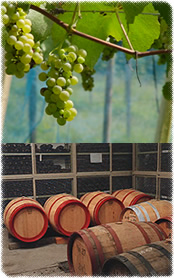
We have a long history as the only unique research institute specializing in wine and wine grapes in Japan. This institute consists of wine microbiology and biotechnology, bio-functional science, and fruit generic engineering. Professor Tohru Okuda in the laboratory of bio-functional science interests in chemical compounds in wine. Red wine contains few hundreds to thousands of polyphenols. Polyphenols have not been completely analyzed due to their chemical reactions among each other during wine fermentation. Polyphenols are considered to be used for various purposes in that some polyphenols may have preventive effects on heart diseases and cancers or can be used in chemical industry as polymers. In addition, since polyphenols play a major role in the taste of wine, providing “bitterness” and “astringency”, the research of polyphenols are receiving great attention now. This institute also has a number of ongoing projects such as genetic research of grapes and wine yeast, grape physiology and wine fermentation, providing broad areas of research and educational activities.
Research and Development of Innovative Materials
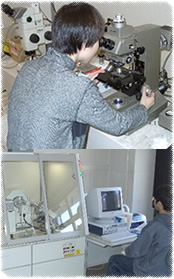
The center for crystal science and technology is making a contribution to the local industry as a unique research institution built in Yamanashi Prefecture that is the center of polishing and processing of precious stone, and quartz-crystal production. Additionally, it is conducting the most advanced and international level research in crystal material science. This center consists of “Research division of crystal bond engineering” and “Research division of crystal structure engineering”. The former division is working on development of materials with new function by controlling local atomic configuration and bonding status between atoms. The goal of the latter group is development of materials with new function by controlling texture that is larger scale than crystal structure. There are numerous substances with unknown function on the planet. Searching these materials, establishment of the world's first development of single crystals and finding new function of these materials are almost like adventures. Highly-motivated challenges to these projects are ongoing in this center.
We conduct research for the most advanced technology to solve water problems and are developing international networks of experts.
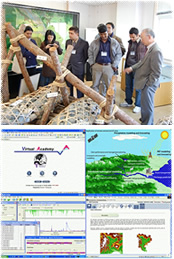
Various problems related to water such as shortage of the water resource, water disasters, deterioration of water environment and diseases transmitted by water are emerging in many parts of the world. Our goal is to develop the most advanced technology for evaluation of hydrology, environmental fate, environmental management, regional planning, health risks, interrelation among them and their complex effects in river basins and conduct research for river basin management to solve these problems. The planning of measures needed for ensuring adequate amount of water resources and water disaster prevention are important subjects in the engineering field; however, medical knowledge such as public health and biochemistry is also essential in prevention and alleviation of infectious diseases regarding water. This center is leading interdisciplinary approach between medical and engineering fields in this area in the nation. Moreover, to solve the water problems in the world, we also focus on research and education about hydrology, environment, planning and health risks in river basins, and international network formation of water experts. In addition, we are providing research education for PhD and Master program students.
We are leading the world in research on fuel cells and solar cells.
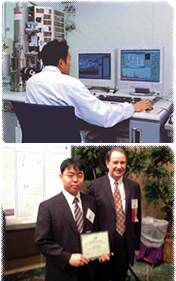
This Center is one of Japan’s representative institutions studying fuel cells and solar cells, attracting attention to clean energy for the next generation. The Division of Fuel Cell Research is promoting national projects through cooperation with companies, in addition to basic studies and development of human resources for the practical application of fuel cells. More than 2,000 household fuel cells providing electricity and warm water have been installed, indicating that their practical use is just around the corner. This past April, the Fuel Cell Nanomaterials Center was established as a sister institution, accelerating the research and development with many new staff members. The Division of Solar Cells and Environmental Science discovered a novel low-temperature tunneling reaction, in that the lower the temperature is, the faster the evolution of the universe proceeds. Utilizing this reaction, a new technology for the preparation of amorphous silicon at low cost was developed in this Division. In addition, new analysis equipment that can detect ultratrace pollutants was developed. The Special Educational Program on Clean Energy trains international-level technical experts and researchers leading this field, collaborating closely with the Faculty of Engineering and Department of Applied Chemistry.
Practice of creation with fun and joy
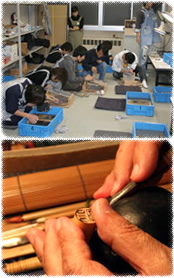
This center is a base of education and research activities for creative technology called “monozukuri” at the University of Yamanashi. Machine shop practice classes are offered for the undergraduate students who belong to the department of mechanical systems engineering, electrical and electron engineering, and applied chemistry engineering. In these classes, we provide a variety of the practical courses in order to master primary metalworking techniques including cutting work, molding, hammered work, welding and so on. In addition, a few courses are also provided to experience more advanced technology using computer aided design and computer aided machining (CAD/CAM) systems, a three-dimensional modeling device for rapid prototyping, and a numerical control (NC) machine tool with high accuracy such as a laser beam machine or a wire-electrical discharge machine. In addition to these classes, we have a class of hands-on experience of traditional crafts in Yamanashi prefecture in order to get university undergraduates interested in monozukuri. Currently we offer four courses consisting of fabrication of Koshu* grained crystal crafts, Koshu hand-carved seals, Koshu ink stones and Koshu gargoyle roof tiles. As well as the education activities mentioned above, we also provide support services for the research promoted by students and faculty members in the university, including the fabrication and designing of experiment devices or parts requested.
* “Koshu” is an ancient name for Yamanashi prefecture.
